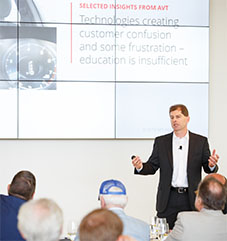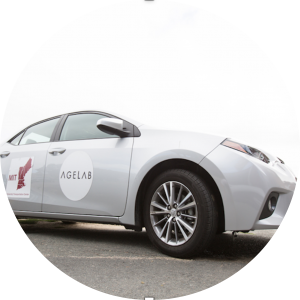MIT AgeLab Research Scientist Bryan Reimer spoke at a TEDx event in Waltham, MA about the challenges ahead for making vehicles safer and what solutions are most sensible. Road traffic injuries are the 8th-leading cause of death worldwide. Over 1.25 million fatalities and 50 million non-fatal injuries occur per year globally. By many measures, traffic accidents represent a vastly undertreated public health crisis. Are autonomous vehicles the answer?

Driver error has been pinpointed as the major cause of traffic accidents.
The most highly touted solution to the problem has been to develop automated technologies to support the driver and, increasingly, to alleviate for the driver the burden of operating the vehicle, and perhaps ultimately remove the driver from the equation altogether.
A future in which nobody drives is probably many decades away. In the meantime, we should expect an evolution, not a revolution, of robots on our roads. Autonomous vehicle technologies are more likely to sooner help get you safely to work than provide a solution for shuttling your children to school or taking your aging parents to the doctor.
A world in which human and technology share the task of driving presents unique challenges.

These challenges lie in the “soft” elements of automation systems that are beyond the underlying sensing technologies and artificial intelligence. Consider one major barrier to autonomous systems helping drivers: many safety technologies are being disabled by their users. Work within the Advanced Vehicle Technologies Consortium at MIT suggests that false alarms and confusion as to where, when and why to use different features are contributing factors. Education is critical to help users develop this understanding and an important foundation for building long-term trust in our automated driving future.
There is no current unified strategy for the testing and deployment of automated and autonomous vehicles in the United States.
Current federal policy discussions are slow-moving and hampered by a decades-old regulatory framework developed before microprocessors ruled the world. This point has been similarly raised by Joan Claybrook and Shaun Kildare, who advocate for stronger federal policies.
Alternatively, Dr. Reimer argues that a public-private partnership between automakers, technologists, and policymakers offers the best opportunity to facilitate the development of effective policies and standards. Such an effort needs to be developed under an air of transparency that has been largely missing to date.
In the long run, automated and driverless vehicles will improve roadway safety. The question is, can we work together to successfully accelerate the process of addressing this public health crisis?
Watch Video